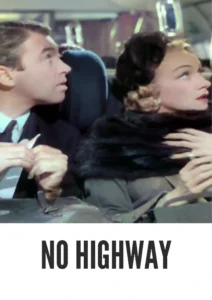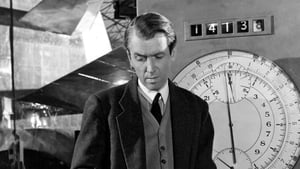Contact: info@alwanfilm.com
Video Sources 0 Views
- Watch trailer
- No Highway


No Highway 1951 Colorized
Synopsis
Table of Contents
ToggleReview: No Highway 1951 Colorized – A Captivating Tale of Science and Suspense

Introduction
No Highway, released in 1951, is a captivating British-American drama directed by Henry Koster. Adapted from the novel of the same name by Nevil Shute, the film combines elements of science fiction, suspense, and human drama to create a thought-provoking cinematic experience. In this review, we’ll delve into the intriguing world of No Highway and explore its themes of scientific discovery, human perseverance, and the pursuit of truth.
Understanding No Highway 1951 Colorized: Director, Cast, and Genre
Directed by Henry Koster, No Highway features an acclaimed ensemble cast led by James Stewart as Theodore Honey, a brilliant but eccentric scientist. The film falls within the genre of speculative fiction, known for its exploration of scientific concepts and their impact on society.
Check The Full Colorized Movies List
Check Our Colorized Movies Trailer Channel
Exploring the World of No Highway 1951 Colorized: Plot and Characters
No Highway follows the story of Theodore Honey, a physicist who works for the Royal Aircraft Establishment in England. When Honey discovers a potential flaw in the design of a new commercial airliner, he embarks on a journey to prove his theory before disaster strikes. Along the way, he faces skepticism from his colleagues, resistance from the airline industry, and personal challenges that test his courage and conviction.
The Art of Film Colorization
While No Highway was originally filmed in black and white, its early colorized version adds a new layer of visual richness and depth to its atmospheric portrayal of post-war England. The colorization process enhances the film’s visual appeal and captures the beauty of its scenic landscapes with stunning clarity.
Early Colored Films: A Brief History
The history of early colored films is marked by innovation and experimentation as filmmakers sought to enhance the visual appeal of their movies. From hand-tinted frames to pioneering technicolor processes, the evolution of colorization techniques transformed the cinematic landscape, offering audiences a new way to experience classic stories and immersive settings.
No Highway (1951) and Its Early Colored Version
The decision to release No Highway in a colorized format was made with the intention of immersing audiences in the vibrant world of post-war England and enhancing the film’s visual impact. While some purists may prefer the original black and white version, the early colorized edition of the film adds a new dimension to its storytelling and captures the scenic beauty of its setting with stunning visual clarity.
The Debate Over Film Colorization
The debate over film colorization continues to divide audiences and industry professionals alike. While some argue that colorization breathes new life into classic films and makes them more accessible to modern audiences, others maintain that it compromises the artistic integrity of the original work. As technology advances and filmmaking techniques evolve, the debate over colorization remains a topic of ongoing discussion within the film community.
Examining No Highway (1951) as an Early Colored Film
Viewing No Highway in its early colorized iteration offers audiences a fresh perspective on its atmospheric portrayal of post-war England. The colorization process enhances the film’s visual appeal and captures the beauty of its scenic landscapes with stunning clarity. As Theodore Honey’s quest for scientific truth unfolds, the audience is drawn into a world of intrigue and suspense that resonates with timeless relevance.
Influence and Legacy: No Highway 1951 Colorized’s Impact on Cinema
No Highway is widely regarded as a pioneering work of speculative fiction that explores the intersection of science, technology, and human drama. Its thought-provoking narrative, compelling characters, and atmospheric cinematography have inspired generations of filmmakers and influenced the portrayal of scientific discovery and ethical dilemmas in cinema. As a testament to its enduring relevance, No Highway remains a timeless classic that continues to captivate audiences with its gripping storytelling and profound insights into the human condition.
Director’s Cinematic Legacy: Beyond No Highway 1951 Colorized
Henry Koster’s directorial legacy extends far beyond No Highway, encompassing a diverse body of work that includes dramas, comedies, and musicals. As a filmmaker, Koster was known for his keen sense of storytelling, attention to detail, and ability to bring out the best in his cast and crew. No Highway stands as a testament to his talent and creativity, solidifying his reputation as one of the great directors of his time.
Themes Explored in No Highway 1951 Colorized
At its core, No Highway explores themes of scientific discovery, human perseverance, and the pursuit of truth. Through its compelling characters and thought-provoking narrative, the film challenges viewers to question their assumptions, confront their fears, and embrace the unknown. As Theodore Honey races against time to prevent a potential disaster, he discovers the power of courage, conviction, and human ingenuity to overcome seemingly insurmountable obstacles.
Reception and Controversy Surrounding No Highway 1951 Colorized
Upon its release, No Highway received widespread critical acclaim for its thought-provoking narrative, powerhouse performances, and atmospheric cinematography. However, the decision to release the film in a colorized format sparked debate among fans and critics alike. While some praised the colorization process for enhancing the film’s visual appeal, others questioned its necessity and expressed concern about preserving the integrity of Koster’s original vision.
Where to Watch No Highway 1951 Colorized Online
For those eager to experience No Highway for themselves, the film is readily available on popular streaming platforms such as Amazon Prime Video, Google Play Movies, and iTunes. Whether viewed in its original black and white format or its early colorized iteration, No Highway offers a captivating and thought-provoking cinematic experience that is sure to resonate with audiences.
FAQs About No Highway 1951 Colorized
1. Is No Highway based on a true story?
No, No Highway is a fictionalized drama adapted from the novel of the same name by Nevil Shute. While the characters and storyline are works of fiction, the film’s exploration of scientific discovery and ethical dilemmas draws inspiration from real-life events and universal human experiences.
2. Who starred in No Highway?
No Highway stars James Stewart as Theodore Honey, the brilliant but eccentric physicist who discovers a potential flaw in the design of a new commercial airliner. His compelling performance brings depth and authenticity to the character, capturing the complexities of Honey’s quest for scientific truth with stunning clarity.
3. What is the central message of No Highway?
At its core, No Highway delivers a powerful message about the importance of scientific inquiry, human perseverance, and the pursuit of truth. Through its thought-provoking narrative and compelling characters, the film challenges viewers to question their assumptions, confront their fears, and embrace the unknown in the quest for knowledge and understanding.
4. Why was No Highway released in a colorized format?
The decision to release No Highway in a colorized format was made with the intention of immersing audiences in the vibrant world of post-war England and enhancing the film’s visual appeal. While some purists may prefer the original black and white version, the early colorized edition of the film adds a new dimension to its storytelling and captures the scenic beauty of its setting with stunning visual clarity.
5. What is the legacy of No Highway?
No Highway is widely regarded as a pioneering work of speculative fiction that continues to captivate audiences with its thought-provoking narrative, powerhouse performances, and atmospheric cinematography. Its enduring legacy has inspired generations of filmmakers and influenced the portrayal of scientific discovery and ethical dilemmas in cinema. As a testament to its timeless relevance, No Highway remains a beloved classic that continues to resonate with audiences for generations to come.
6. Are there any sequels or remakes of No Highway?
While there have been no official sequels or remakes of No Highway, the film’s thought-provoking narrative and compelling characters have inspired countless adaptations and reinterpretations in various media. However, none have achieved the same level of critical acclaim or cultural significance as the original 1951 film.
7. Where can I watch No Highway online?
For those eager to experience No Highway for themselves, the film is readily available on popular streaming platforms such as Amazon Prime Video, Google Play Movies, and iTunes. Whether viewed in its original black and white format or its early colorized iteration, No Highway offers a captivating and thought-provoking cinematic experience that is sure to resonate with audiences for generations to come.
Conclusion
In conclusion, No Highway (1951) stands as a captivating blend of science fiction, suspense, and human drama that continues to captivate audiences with its thought-provoking narrative, powerhouse performances, and atmospheric cinematography. Whether viewed in its original black and white format or its early colorized iteration, Henry Koster’s compelling exploration of scientific discovery, human perseverance, and the pursuit of truth offers a timeless cinematic experience that is sure to resonate with audiences for generations to come.
As Theodore Honey confronts his fears, challenges his assumptions, and embraces the unknown in the quest for knowledge and understanding, viewers are reminded of the enduring power of human curiosity, courage, and ingenuity to overcome the greatest of obstacles. With its timeless relevance and profound insights into the human condition, No Highway remains a beloved classic that continues to inspire and entertain audiences around the world.













